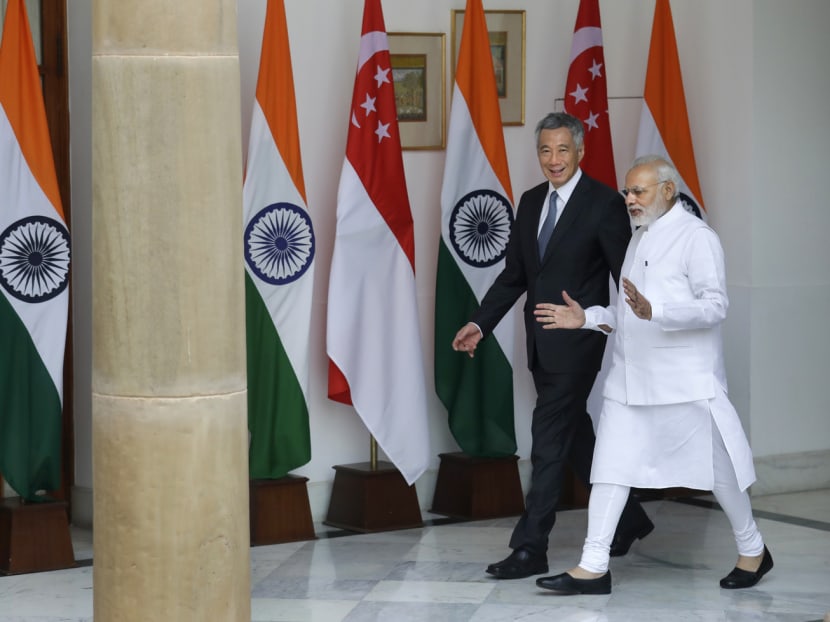Singaporeans have benefited from long-standing India ties, says PM Lee
UDAIPUR (India) — Over the years, Singapore and India have inked numerous pacts and embarked on several collaborations including a deal to avoid double taxation in 1994, a landmark agreement that gives Singapore businesses preferential access to the Indian market, and more recently, helping to draw up a master-plan for the new capital of the Indian state of Andhra Pradesh.

Indian Prime Minister Narendra Modi, right, talks with PM Lee Hsien Loong as they walk for a delegation level meeting, in New Delhi, India, on Oct 4, 2016. Photo: AP
UDAIPUR (India) — Over the years, Singapore and India have inked numerous pacts and embarked on several collaborations including a deal to avoid double taxation in 1994, a landmark agreement that gives Singapore businesses preferential access to the Indian market, and more recently, helping to draw up a master-plan for the new capital of the Indian state of Andhra Pradesh.
And Prime Minister Lee Hsien Loong noted yesterday that the “substantial” benefits from the good relations nurtured over time have — while not always immediately felt — cascaded down to ordinary Singaporeans and businesses, from job opportunities provided by Indian firms setting up shop in Singapore to a slice of the multibillion-dollar infrastructure pie in Andhra Pradesh for the Republic’s companies.
“Because we have been pursuing our relationship with India over these many years ... our business relationships have grown. We have got (Singapore) companies which are (in India). We have got Singaporeans who are here working, finding many opportunities here. And Indian companies have also come to Singapore and invested in Singapore, and creating jobs for Singaporeans,” said Mr Lee, who was speaking to the Singapore media after a five-day official visit to India where more agreements and partnerships between the two countries were announced.
While the India economy has yet to reach the heights that many had hoped it would, Mr Lee reiterated his belief in the potential of the South Asian country. Asked whether Singapore is hedging its bets on India fully realising its economic potential after several false starts, Mr Lee said: “I wouldn’t say I am hedging my bets, I am trying to bet on all the good horses.”
Acknowledging that India has had “fits and starts”, Mr Lee added: “If you compare it to where they were back in 1990, when Dr Manmohan Singh was Finance Minister and started the liberalisation under Prime Minister Narashima Rao, I think they have made a lot of progress ... Of course, we still see many difficulties ahead but we believe that there are opportunities and we would like to work on it with them.”
During Mr Lee’s visit, he witnessed the exchange of several bilateral agreements on skills development, including one to build a skills centre in the north-east state of Assam.
“(Our Institute of Technical Education) has got the know-how, so we share our know-how with them as goodwill ... These are things (in) which you need a baseline of interaction and goodwill in order for other good things to happen,” said Mr Lee.
An aim of his visit was to give Singapore’s Indian partners “an extra push”, even as Singapore-India collaborations are picking up pace since the Strategic Partnership formed last November.
“The global economy is slow, there are many uncertainties, but we know there are specific things we can do cooperating with our partners ... Each time I visit one of these places I try and push the agenda a little bit forward,” said Mr Lee. Prior to his India trip, Mr Lee had visited China and Japan in the past month. He will be going to Australia next week.
For instance, Mr Lee hopes the ongoing review of the Comprehensive Economic Cooperation Agreement — launched in May 2010 — can wrap up soon. The review had been held up by several issues, including bottlenecks faced by some Indian banks and professionals wanting to move to Singapore.
Both countries are also reviewing their tax treaty, with India planning to remove the Republic’s capital tax exemption — in line with the South Asian country’s position towards Mauritius. In an effort to guard against “black money”, India will remove exemption for Mauritius from April 1.
Stressing that Singapore is a “respectable financial centre”, Mr Lee said: “We have made very sure that if there is any money laundering or round tripping or black money, we will get to know about it and we will put a stop to it.”
He added: “It’s not a question of whether India is entitled to do this, which of course they are, but whether it is in India’s interests to do it, and if so, what is the best way to do it without causing unintentional harm to India. Because ... Singapore has become a significant source of investments into India.” The issue was brought up during a meeting earlier this week between Mr Lee and Mr Modi.
Mr Lee said: “I think (Mr Modi) understands Singapore’s case, but ... he has made black money a big issue in his election campaign. It is a big issue in India, and therefore it’s something which India feels constrained to follow up and do something about. Now, we’ll see how we can square the circle.”









